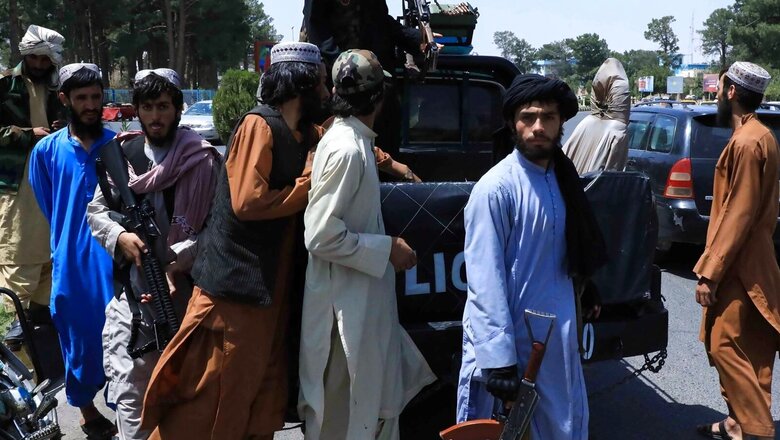Taliban Near Gates of Kabul, Govt Preps for 'Peaceful Transfer of Power': Here’s What We Know So Far

views
The Taliban have refused the Afghanistan government’s power sharing proposal and have assured that they will provide a safe passage to the leaders, including President Mohammad Ashraf Ghani and Vice President Amrullah Saleh. The insurgent group reiterated that they will not resort to violence in the capital city of Kabul.
Earlier, the Taliban in a statement said they will not enter Kabul by force. The group said that talks are underway with the other side to negotiate entering Kabul in a secure environment to prevent any harm to the people. Follow LIVE Updates
Afghan Interior Minister Abdul Sattar Mirzakwal said Sunday there would be a “peaceful transfer of power” to a transitional government, after the Taliban ordered its fighters to hold back from entering Kabul. “The Afghan people should not worry… There will be no attack on the city and there will be a peaceful transfer of power to the transitional government,” he said in a recorded speech.
‘Taliban Fighters Asked to Wait at Gates of Kabul’
Taliban fighters were on the outskirts of Kabul on Sunday and on the brink of a complete military takeover of Afghanistan, but a spokesman said they had been ordered not to enter the city.
“The Islamic Emirate instructs all its forces to stand at the gates of Kabul, not to try to enter the city,” a spokesman for the Taliban tweeted. “Until the completion of the transition process, the responsibility for the security of Kabul is with the other side (the Afghan government)”.
What Does Capture of Kabul Mean for Afghanistan?
The capture of Kabul would cap an astonishing rout of government forces and warlord militias across all of Afghanistan’s major cities achieved in just 10 days.
It would also see the hardline Islamic group take back power two decades after US-led forces toppled it in the wake of the September 11, 2001 attacks.
The scale and speed of the insurgents advance have shocked Afghans and the US-led alliance that poured billions into the country over the past two decades.
President Ashraf Ghani’s government was left completely isolated on Sunday after the Taliban claimed the anti-Taliban northern stronghold of Mazar-i-Sharif and the eastern city of Jalalabad.
Like with most of the other captured cities, the seizure of power came after government forces surrendered or retreated. It left the Taliban holding all the cards in any negotiated surrender of the capital.
On Saturday, Ghani sought to project authority with a national address in which he spoke of “re-mobilising” the military while seeking a “political solution” to the crisis. Ghani offered no public comments on Sunday.
Evacuations Underway:
President Joe Biden ordered the deployment of an additional 1,000 US troops to help secure the emergency evacuation from Kabul of embassy employees and thousands of Afghans who worked for American forces and now fear Taliban reprisals.
That was on top of the 3,000 American soldiers deployed in recent days, and 1,000 left in-country after Biden announced in May that the final withdrawal of the 20-year military presence in Afghanistan would be completed by September 11.
That decision has come under increased scrutiny given the collapse of the Afghan armed forces, but he insisted Saturday there was no choice. “I was the fourth president to preside over an American troop presence in Afghanistan — two Republicans, two Democrats. I would not, and will not, pass this war onto a fifth,” Biden said.
ALSO READ | Friends, Foes & Those in Between: A Look at the Taliban’s Ties With Foreign Powers
Taliban Celebration:
Videos posted on pro-Taliban social media accounts showed the group’s heavily armed fighters in cities across the country, waving white flags and greeting locals. Most of the fighters appeared young, suggesting they were most likely infants or unborn when the Taliban was toppled from power in 2001. In Mazar-i-Sharif, Taliban fighters quickly took charge on Sunday.
“They are parading on their vehicles and motorbikes, firing into the air in celebration,” said Atiqullah Ghayor, who lives near the city’s famed blue mosque.
Fear and Panic in Kabul:
As residents reported seeing Taliban insurgents enter some of Kabul’s outer suburbs, panic and fear reigned. “I saw police taking off their uniforms and putting on shalwar kameez,” said one resident, referring to traditional South Asian clothing.
Panicked residents swarmed banks for a second-straight day, hoping to withdraw their savings. Many were already resigned to the Taliban taking power. “My only wish is that their return leads to peace. That is all we want,” said Kabul shopkeeper Tariq Nezami.
For the tens of thousands who have sought refuge in Kabul in recent weeks, the overwhelming mood was one of apprehension and fear. One doctor who arrived in the capital with his 35-strong family from Kunduz said he planned to return today. “I am worried there will be a lot of fighting here. I would rather return home, where I know it has stopped,” he told AFP, asking not to be named.
Warlords Give Up With Surprising Ease:
Afghanistan’s warlords vowed defiantly to defend their strongholds from the Taliban and crush the insurgents. But, like the government’s forces, they too gave up with surprising ease.
As the insurgents swept through the north in a surprise offensive targeting Afghanistan’s anti-Taliban bastion, President Ashraf Ghani called for a national mobilisation of militia forces. Despite Ghani’s chequered history with the country’s warlords, the beleaguered president was hoping they could help turn the tide.
In the besieged northern city of Mazar-i-Sharif, Ghani was looking to longtime strongman Atta Mohammad Noor and ethnic Uzbek warlord Abdul Rashid Dostum. Both were known for their dogged defence against the Taliban in the 1990s, and had remained influential figures during the past two decades of war.
However, late Saturday, both men’s militias were routed after the Afghan military units they were supporting surrendered to the Taliban. Dostum and Noor fled across the nearby Uzbek border.
Their rout came days after fellow strongman Ismail Khan was captured by Taliban fighters in the western city of Herat.
Afghan Soldiers Seek Taliban Amnesty After Fall of Herat:
Thousands of Afghan soldiers thronged the governor’s office in the western city of Herat looking for the Taliban — not to battle them but to seek amnesty. Afghanistan’s third-biggest city fell without a fight on Thursday as government forces retreated and Herat’s famous warlord Ismail Khan was detained by the insurgents.
With fears of violent reprisals growing as the Taliban get closer to a full takeover of the country, Afghan soldiers in Herat — nearly all of them in civilian clothes — gathered Saturday to try and get a letter of amnesty.
Afghan Soldiers Flee to Uzbekistan:
Uzbekistan said Sunday that 84 Afghan soldiers crossed its border fleeing the Taliban as the militant group seized Afghanistan’s fourth-largest city in its blistering takeover of the country. Tashkent said it had offered humanitarian assistance to the soldiers. The Central Asian country said border troops had arrested the “violators of the state border” and that authorities held “talks with the Afghan side” about their return to Afghanistan in a foreign ministry statement.
Who’s Who in the Taliban Leadership:
The Taliban movement’s inner workings and leadership have always been largely shrouded in secrecy, even during their rule of Afghanistan from 1996 to 2001. As the hardline Islamic group appears to be on the brink of regaining power, here is a rundown of what little is known about its leadership.
Haibatullah Akhundzada, the supreme leader: Haibatullah Akhundzada was appointed leader of the Taliban in a swift power transition after a US drone strike killed his predecessor, Mullah Mansour Akhtar, in 2016. Before ascending the movement’s ranks, Akhundzada was a low-profile religious figure. After being appointed leader, Akhundzada secured a pledge of loyalty from Al Qaeda chief Ayman al-Zawahiri, who showered the religious scholar with praise — calling him “the emir of the faithful”. This which helped seal his jihadi credentials with the group’s long-time allies.
Mullah Baradar, the founder: Abdul Ghani Baradar was raised in Kandahar — the birthplace of the Taliban movement. Like most Afghans, Baradar’s life was forever altered by the Soviet invasion of the country in the late 1970s, transforming him into an insurgent. He was believed to have fought side-by-side with the one-eyed cleric Mullah Omar. The two would go on to found the Taliban movement in the early 1990s amid the chaos and corruption of the civil war that erupted after the Soviet withdrawal. In recent years, he was appointed head of the Taliban’s political office and oversaw the signing of the withdrawal agreement with the Americans.
Sirajuddin Haqqani, the Haqqani Network: The son of the famed commander from the anti-Soviet jihad, Jalaluddin Haqqani. Sirajuddin doubles as both the deputy leader of the Taliban movement while also heading the powerful Haqqani network.
Mullah Yaqoob, the scion: The son of the Taliban’s founder Mullah Omar.Mullah Yaqoob heads the group’s powerful military commission, which oversees a vast network of field commanders charged with executing the insurgency’s strategic operations in the war.
(With AFP inputs)
Read all the Latest News, Breaking News and Assembly Elections Live Updates here.















Comments
0 comment